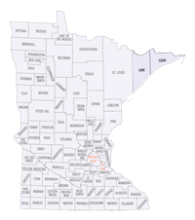Minnesota's Most Rural Counties Get FTTH Following Stimulus Awards
I just spoke with Danna MacKenzie of Cook County and Gary Fields of National Public Broadband (working with Lake County) to find out just how excited they are about yesterday's announcement of broadband stimulus awards. Both Lake and County (separate projects) have been funded to build fiber-to-the-home networks to everyone on the power grid in the region. They are pretty excited. In a few years, these North Shore Communities will likely have better broadband options than the metro region of Minneapolis and Saint Paul -- a far cry from the beginning of this year when a single fiber cut stranded the whole north shore. Bob Kelleher at Minnesota Public Radio covered the awards:
Combined, they will connect 37,000 residents, 1,000 businesses and 98 institutions such as hospitals and schools.
Cook County actually has a double whammy - they already stood to benefit from the North East Service Cooperative, which is building high capacity fiber-optic lines through the North Shore to offer middle-mile backhaul and connect local government facilities and schools. As of yesterday, they will also get a fiber-to-the-home network from the Arrowhead Electric Cooperative. Cook, currently served in part by Qwest, has little access to true broadband -- some 37% have access to anemic DSL connections and the rest are stuck with dial-up. Details of the award from Kelleher at MPR:
Joe Buttweiler, who directs membership services with the Lutsen-based Arrowhead Electric Cooperative, said 70 percent of the federal award is a grant and the remainder a loan. He said the cooperative will add another $600,000 for capital.
Back in April, Blandin's Broadband blog published the short summary of the Arrowhead project:



